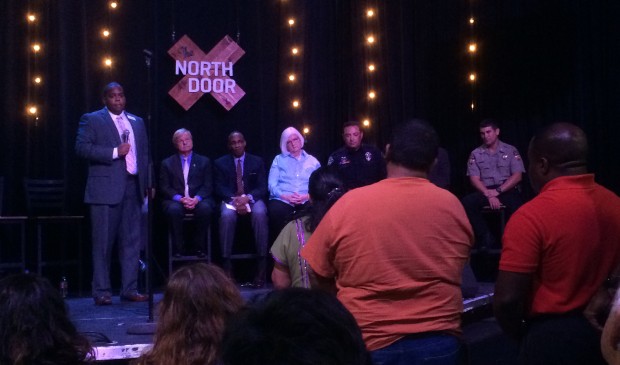APD faces tough questions at community forum
Wednesday, September 3, 2014 by
Gene Davis During an emotionally charged public forum on police accountability, Austin Police Department Chief Art Acevedo defended the department against accusations that officers unfairly target minorities.
The Travis County Democratic Party hosted Tuesday’s forum at the North Door after it passed a resolution calling for action for APD to “address systemic issues surrounding racial profiling, excessive use of force and accountability in relations to the African-American community.” In particular, Travis County Democratic Party Secretary Vince Harding said members were alarmed that while black people account for only 8 percent of Austin’s population, they make up 24 percent of drivers whose cars are searched by APD. Also, between 2002 and 2012, seven of the 10 unarmed people killed by APD were black.
“It was based upon these facts that we call on APD to develop additional policies that would address these issues,” Harding said.
In response, Acevedo said that APD officers use deadly force about 50 percent less than other police departments. He said that in addition to the state law requirements for the use of deadly force by an officer, APD has a “moral compass” policy that requires an officer to consider whether they should use deadly force.
“For every incident of deadly force, you have dozens and dozens of incidents where they could have but didn’t,” Acevedo said.
Acevedo explained that APD’s disproportionately high number of interactions with black people is due to the department’s data driven policing. He said that, unfortunately, crime is high due to socio-economic factors in areas such as Rundberg and Dove Springs, which have a larger percentage of minorities. As a result of the higher crime numbers, APD puts more officers in those areas.
Acevedo’s fellow panel members shared their own thoughts of how APD could improve its alleged racial profiling and excessive use of force against the black community. Greater Austin Black Chamber of Commerce member Ashton Cumberbatch said the focus should be on recruiting well-qualified officers who have a history of interacting with different groups of people and respecting everybody.
“If you have individuals who are fearful of individuals because, let’s be honest about it, they grew up and went to a school where there weren’t many African-Americans; they go to a high school where there weren’t many African-Americans, and they go to a college where there weren’t many African-Americans, then they come out and you hand them a gun and a billy club and a Taser and send them into a neighborhood where there are a majority of African-Americans, the result generally is going to be not good,” Cumberbatch said.
Following thoughts from Cumberbatch and other panel members, Sgt. Wayne Vincent, president of the Austin Police Association, said APD officers already face stricter policies than almost any other police department. He said further restrictions could have a detrimental impact on public safety.
“You have tied these officers’ hands and given them a signal: retreat when it looks like something might get bad,” he said. “I’m not so sure that’s what the community wants the police department to be.”
Following pre-written questions, panel members heard from audience members who lined up to speak. Although billed as a Q&A with the audience, this part of the night primarily saw audience members giving impassioned speeches, with Acevedo responding.
The most heated part of the night came after a Dove Springs kindergarten teacher told Acevedo that an overwhelming majority of her 5-year-old students already distrust the police.
Acevedo responded that a distrust of police at such a young age likely comes from a child’s family. Multiple audience members loudly heckled this response.
“I’m sorry, that’s the same kid that when they don’t do their homework, who do they blame? Their teacher,” Acevedo said over the jeers.
While there was no shortage of disagreement throughout the night, all panel members agreed that a future mandate would likely require all APD officers to wear cameras on their bodies. Vincent said the mandate should go a step further and apply to elected politicians, because “that’s where the real distrust is.”
Panel members also acknowledged that every person has preconceived racial biases, and that those biases should be recognized so they can be dealt with.
“The human condition is imperfect, that’s why we have to be vigilant,” Acevedo said.
You're a community leader
And we’re honored you look to us for serious, in-depth news. You know a strong community needs local and dedicated watchdog reporting. We’re here for you and that won’t change. Now will you take the powerful next step and support our nonprofit news organization?







